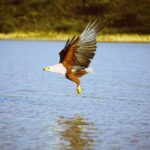The African fish eagle, a majestic bird of prey, is not currently considered endangered, with a stable population of around 300,000 individuals. However, this iconic species faces several threats that could potentially impact its long-term survival. In this blog post, we’ll explore the key reasons why African fish eagles are at risk and what can be done to protect them.
Pesticide Contamination
One of the primary threats to African fish eagles is the use of pesticides, which can have devastating effects on these birds. Pesticides can contaminate the fish and other prey that African fish eagles rely on, leading to the accumulation of toxic chemicals in their bodies. This can result in thinning of eggshells, impaired vision, and reduced reproductive success.
The problem is particularly acute in South Africa, where studies have found high levels of pesticides in the bodies of African fish eagles. This is likely due to the widespread use of pesticides in agricultural and industrial activities, which can leach into the water bodies where these birds hunt.
Habitat Degradation and Water Pollution
Image source: African fish eagle above water by Mehmet Karatay
Another significant threat to African fish eagles is the degradation of their natural habitats and the pollution of the water bodies they depend on. The development of shoreline areas, as well as industrial and agricultural runoff, can severely impact the availability and health of the fish and other aquatic life that these birds rely on for food.
Pollution can lead to the contamination of water sources, making them unsuitable for the fish that African fish eagles hunt. This can force the birds to travel further to find suitable prey, increasing their energy expenditure and reducing their overall fitness.
Entanglement in Fishing Nets
African fish eagles are also at risk of becoming entangled in non-biodegradable fishing nets, which can lead to injury or even death. These birds often dive into the water to catch their prey, and if they become caught in the nets, they may be unable to free themselves, leading to a slow and painful death.
This threat is particularly concerning in areas where there is heavy fishing activity, as the presence of these nets can pose a significant danger to the African fish eagle population.
Climate Change and Extreme Weather Events
Climate change is another factor that could potentially impact the African fish eagle population. As the climate continues to change, these birds may face challenges in adapting to new environmental conditions, such as changes in water availability, prey distribution, and nesting sites.
Extreme weather events, such as droughts, floods, and storms, can also have a devastating impact on African fish eagle populations. These events can disrupt the birds’ breeding and feeding patterns, leading to reduced reproductive success and increased mortality.
Conservation Efforts
Despite these threats, there are ongoing efforts to protect the African fish eagle and ensure its long-term survival. Conservation organizations and government agencies are working to implement measures such as:
- Reducing the use of pesticides and promoting sustainable agricultural practices.
- Improving water quality and habitat management to support healthy fish populations.
- Educating local communities about the importance of the African fish eagle and the need to protect it.
- Enforcing regulations to prevent the use of non-biodegradable fishing nets and other harmful practices.
- Monitoring the population and health of African fish eagles to identify and address emerging threats.
By working together, we can help ensure that this majestic bird of prey continues to soar over the African skies for generations to come.
Conclusion
The African fish eagle is a symbol of strength and resilience, but it faces a range of threats that could potentially impact its long-term survival. From pesticide contamination to habitat degradation and climate change, these birds face a complex set of challenges that require a comprehensive and coordinated response.
By understanding the specific threats facing African fish eagles and taking action to address them, we can help protect this iconic species and ensure that it continues to thrive in its natural habitat. Through conservation efforts, education, and sustainable practices, we can work to safeguard the future of the African fish eagle and the ecosystems it calls home.
References:
- The African Fish Eagle: endangered by pesticide – Kenya Birding
- African fish eagle – Wikipedia
- African Fish Eagle – Overberg Crane Group
- Long-term survival despite low genetic diversity in the critically endangered Madagascar fish-eagle (Haliaeetus vociferoides) – PubMed
- African Fish Eagle Bird Facts | Haliaeetus Vocifer – A-Z Animals

